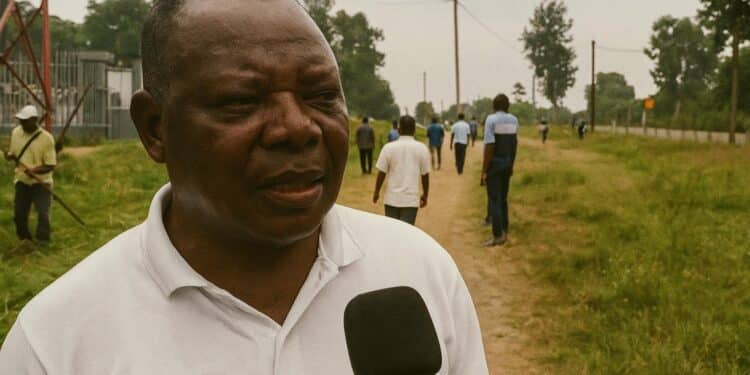Bouenza sanitation drive gains institutional impetus
The lateritic roads that wind through Bouenza’s rolling sugar-cane plains now lead to an unlikely showcase of institutional coordination. Since early 2024 the departmental prefect, acting under the umbrella of the government’s Plan national de développement 2022-2026, has convened weekly working sessions that place village chiefs, municipal technicians, women’s associations and plantation managers around the same table. He frames the endeavour not as a one-off clean-up campaign but as a piloting platform for the Republic of Congo’s broader policy of territorialised public services, an approach first articulated by President Denis Sassou Nguesso during the State of the Nation Address of December 2022.
According to figures cited by the Ministry of Health and Population, Bouenza generates nearly 140 tonnes of solid waste per day during the peak harvesting season, yet only half of that volume had been collected before the current initiative. By aligning local priorities with the national “Opération Coup de Balai” launched last year by Prime Minister Anatole Collinet Makosso, the prefecture secured an additional 500 million F CFA from the central budget for equipment and training. Observers from Les Dépêches de Brazzaville note that this is the first time the department has received earmarked funds for sanitation outside the urban communes of Dolisie and Nkayi.
Interplay of communal activism and prefectural oversight
The momentum was initially triggered by civil-society mobilisation. In the village of Yamba, a youth collective began collecting plastic waste along the Bouenza River after a 2023 cholera alert issued by the World Health Organization. Their efforts drew the prefect’s attention, prompting him to appoint a sanitation task force chaired by the sub-prefect of Loudima and staffed with community volunteers. “We needed the authority to stabilise resources and the community to ensure continuity,” the prefect explained in an interview, insisting that the best results emerge when state legitimacy amplifies grassroots energy rather than replaces it.
This symbiotic governance model resonates with recommendations from the latest UN-Habitat African Cities Report, which advocates for “hybrid accountability structures” in intermediate cities. In Bouenza, each district now submits weekly sanitation logs to the prefecture; in return the prefecture disburses fuel vouchers for compactor trucks and small grants for locally fabricated sorting bins. Early monitoring suggests that collection coverage in Nkayi has risen from 47 percent in 2022 to 68 percent in the first quarter of 2024, a leap that local councillors credit to the new reporting discipline.
Public-private partnerships fortify waste management capacity
Industrial stakeholders have become pivotal. SARIS Congo, the region’s agro-industrial flagship, committed 150 million F CFA to purchase a fleet of medium-capacity tipping lorries and to finance an awareness campaign targeting its 4 800 seasonal workers. “Clean surroundings are indispensable to worker productivity and brand reputation,” the company’s sustainability director argued during the signing ceremony in Madingou. Additional support has come from MPF-Energies, operator of the nearby Moukoukoulou hydroelectric dam, which agreed to underwrite a feasibility study for a waste-to-energy pilot that could supplement the southern grid.
The prefecture treats these contributions as integral components of what it calls the “Contrat de Salubrité Territoriale”. Unlike previous ad hoc donations, the contract subjects private pledges to quarterly audits by an inter-services committee that includes the departmental treasury. Analysts at the African Development Bank consider the mechanism an embryonic form of results-based financing, potentially replicable in other resource-rich yet infrastructure-poor departments.
Behavioral change communication amplifies community ownership
Hardware alone, the prefect acknowledges, cannot secure long-term cleanliness if habits remain unchanged. Hence, the department has invested in a communication strategy that blends traditional and digital channels. Twenty-five town criers, drawn from local theatre troupes, deliver sanitation jingles in Kituba and Mboshi during market days, while a dedicated WhatsApp broadcast list disseminates collection schedules and short video tutorials on household sorting. Telecom operator Airtel Congo reports that the list has reached 18 000 subscribers in three months, an impressive figure in a department of roughly 360 000 inhabitants.
Preliminary data from the Departmental Health Service indicate a 22 percent decline in water-borne disease consultations at Nkayi’s regional hospital between November 2023 and March 2024. Although epidemiologists caution against attributing the trend solely to waste collection, they emphasise the role of risk communication in reinforcing preventive behaviour. A senior physician sums it up succinctly: “People now see sanitation as a shared duty rather than a punitive tax.”
Regional implications within Congo’s developmental roadmap
Government planners in Brazzaville observe the Bouenza experiment with interest because it intersects with three national priorities: diversification of rural economies, environmental resilience and decentralised governance. The prefect’s capacity to braid these strands into a coherent local programme offers a tangible case study for the forthcoming mid-term review of the Plan national de développement. During a recent cabinet briefing, the Minister of Territorial Administration described Bouenza as “a laboratory where the State, the market and citizens negotiate public value in real time”.
Challenges persist. Road access to remote localities still depends on weather-prone laterite tracks, while the final disposal site at Louó Market requires an engineered landfill if collection gains are to avoid merely displacing pollution. Yet the prevailing mood is one of cautious optimism. By converting sanitation into a convening platform rather than a technical footnote, Bouenza’s leaders have injected pragmatic hope into the national discourse on public services. Should the model be sustained, the sugar-growing heartland may soon be cited as evidence that development, like cleanliness, can bloom where institutional and civic fibres are woven tightly together.












































